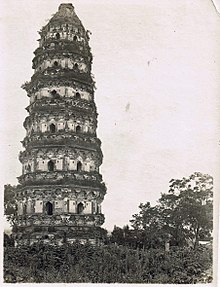The Tiger Hill Pagoda or Huqiu Pagoda (Chinese: 虎丘塔; pinyin: Hǔqiū tǎ; Suzhou Wu: Hou chieu thaeh, Wu Chinese pronunciation: [hou tɕʰʏ tʰɑʔ]), officially the Yunyan Pagoda[1] (Chinese: 云岩寺塔; pinyin: Yúnyán sì tǎ; Suzhou Wu: Yuin nge zy thaeh, Wu Chinese pronunciation: [ɦʏn ŋe̞ zz̩ tʰɑʔ]), is a Chinese pagoda situated on Tiger Hill (Huqiu) in Suzhou city, Jiangsu Province of Eastern China. It is nicknamed the 'Leaning Tower of China'.[1]



History edit
The primary pagoda of the former Yunyan Temple, which was founded in 327 and rebuilt for the last time in 1871. The temple suffered damage in successive wars and most of the temple was destroyed during the Second Sino-Japanese War. Some elements of the temple such as the formal entrance, the Yunyan Pagoda, and several other buildings and smaller shrines have survived, and now stand as landmarks throughout Tiger Hill Park.
Construction of the pagoda began in 907 CE, during the later period of the Five Dynasties period, at a time when Suzhou was ruled by the Wuyue Kingdom. Construction was completed in 961 CE during the Song Dynasty.[2]
The uppermost stories of the pagoda were built as an addition during the reign of the Chongzhen Emperor (1628–1644), the last emperor of the Ming Dynasty.[3]
Description edit
The Yunyan Pagoda rises to a height of 47 m (154 ft). The pagoda has seven stories and is octagonal in plan, and was built with a masonry structure designed to imitate wooden-structured pagodas prevalent at the time.
Leaning tower edit
In more than a thousand years the pagoda has gradually slanted due to forces of nature. Now the top and bottom of the tower vary by 2.32 meters. The entire structure weighs some 7,000,000 kilograms (15,000,000 lb), supported by internal brick columns.[3] However, the pagoda leans roughly 3 degrees due to the cracking of two supporting columns.[3]
The pagoda leans because the foundation is originally half rock and the other half is on soil. In 1957, efforts were made to stabilize the pagoda and prevent further leaning. Concrete was also pumped into the soil forming a stronger foundation.
During the reinforcement process, a stone casket containing Buddhist scriptures was found. The container had an inscription noting the completion date of the pagoda as the seventeenth day of the twelfth month of the second year of the Jianlong era (961 CE).
Present day edit
The Yunyan Pagoda is a designated Major National Historical and Cultural Site in Jiangsu. As of September 2010, public access to the top of the tower is no longer allowed.[citation needed]
Notes edit
- ^ a b Ingles 1982, p. 144
- ^ "Tiger Hill, Hu Qiu, Suzhou".
- ^ a b c Ingles 1982, p. 145